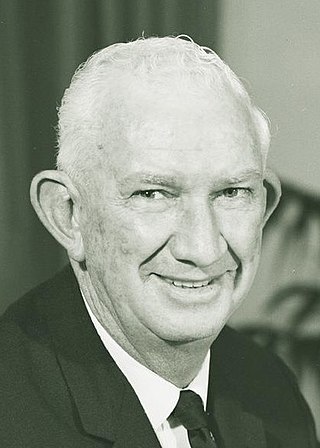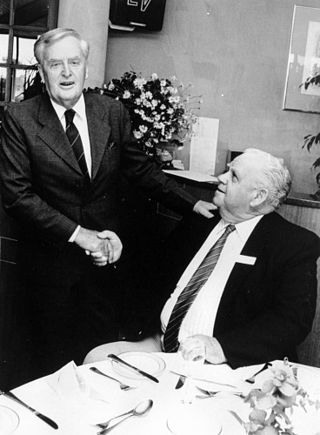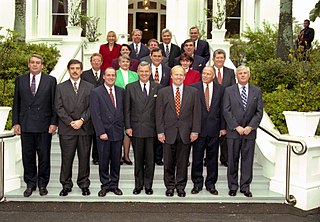
Sir Johannes Bjelke-Petersen was a conservative Australian politician. He was the longest-serving and longest-lived premier of Queensland, holding office from 1968 to 1987, during which time the state underwent considerable economic development. He has become one of the most well-known and controversial figures of 20th-century Australian politics because of his uncompromising conservatism, political longevity, and the institutional corruption of his government.

The governor of Queensland is the representative in the state of Queensland of the monarch, currently King Charles III. In an analogous way to the governor-general at the national level, the governor performs constitutional and ceremonial functions at the state level. In particular the governor has the power to appoint and dismiss the premier of Queensland and all other ministers in the Cabinet, and issue writs for the election of the state parliament.

Michael John Ahern was an Australian National Party politician who was Premier of Queensland from December 1987 to September 1989. After a long career in the government of Sir Joh Bjelke-Petersen, Ahern became his successor amid the controversy caused by the Fitzgerald Inquiry into official corruption. Ahern's consensus style and political moderation contrasted strongly with Bjelke-Petersen's leadership, but he could not escape the division and strife caused by his predecessor's downfall.

Jack Charles Allan Pizzey was a Queensland Country Party politician. He was Premier of Queensland, in a coalition with the Liberal Party, from 17 January 1968 until his death on 31 July that year. To date, he is the most recent premier of an Australian state to die in office.

Sir Gordon William Wesley Chalk, was Premier of Queensland for a week, from 1 to 8 August 1968. He was the first and only Queensland Premier from the post-war Liberal Party.

Russell James Hinze was an Australian politician who was a member of the Queensland Legislative Assembly. He presided over an era of controversy that included the setting up of the Racing Development Fund, ministerial re-zonings and the licensing of Jupiters Casino. His career in public life spanned almost four decades, first in local government in the 1950s and 1960s, and then in the Queensland Legislative Assembly from 1966 to 1988. After his exit from Parliament he was charged with eight counts of corruption, but died before going to trial.

The 1989 Queensland state election was held in the Australian state of Queensland on 2 December 1989 to elect the 89 members of the state's Legislative Assembly. This was the first election following the downfall of seven-term premier Sir Joh Bjelke-Petersen at the end of 1987.
Leisha Teresa Harvey is a former Australian politician. She was a National Party member of the Legislative Assembly of Queensland from 1983 to 1989, representing the electorate of Greenslopes. She served as Minister for Health in the government of Mike Ahern government from 1987 until her sacking in January 1989. She lost her seat at the election that December, and was not long out of Parliament when she was charged with numerous counts of misappropriation of public funds concerning her usage of her official credit card. After a high-profile trial in 1990 and subsequent conviction, she spent five months in prison and a further seven months in home detention.
Donald Frederick Lane was a Minister of Transport in the Bjelke-Petersen state of Queensland's coalition government. A former policeman in the Special Branch, in 1971 he was elected as the Liberal member for Merthyr, an electorate which included the Fortitude Valley where a lot of the then illegal brothels and casinos were located. During his time with the Police, he had gotten to know Jack Herbert the Chief Organiser of The Joke, and the "Rat Pack" of Terry Lewis, Tony Murphy and Glenn Hallahan well. Following the 1983 Queensland state election he switched to the National Party, providing it with an outright majority, and was rewarded with a ministry. He went on to lead the National Party’s submission to the Electoral Commission to more effectively gerrymander and malapportion seats to increase National Party control. It was revealed in the Fitzgerald Inquiry, that Lane had significant unexplained income, and was alleged by Jack Herbert to have taken bribes. Lane didn’t admit to taking bribes, instead he admitted to abusing Ministerial expenses and claimed a lot of other Ministers had done the same. In the end Lane and three other Bjelke-Petersen ministers were tried in the District Court and sentenced to twelve months imprisonment for falsifying their expense accounts.

William Angus Manson Gunn AM was an Australian politician who represented the Queensland Legislative Assembly seat of Somerset from 1972 until 1992. A member of the National Party, he also served as a Minister and Deputy Premier in various Queensland administrations during the 1980s, and was instrumental in establishing the Fitzgerald Inquiry.
Sir William Edward Knox OSJ, KSJI was born in Kew, Victoria, Australia and was the Member of the Legislative Assembly of Queensland representing the district of Nundah for the Liberal Party between from 1957 to 1989. He was Liberal leader in the Legislative Assembly of Queensland from 1976 to 1978 and again from 1983 to 1988 and was given life membership that same year.
The Court ministry was the 27th ministry of the Government of Western Australia, led by Liberal Premier Sir Charles Court and deputy Des O'Neil. It commenced on 5 June 1975, following the Court–McPharlin Ministry, 15 months after the Coalition's electoral defeat of the Tonkin Labor government. It was followed by the O'Connor Ministry upon Court's retirement as Premier on 25 January 1982.

The Beattie Ministry was a Ministry of the Government of Queensland, led by Labor Premier Peter Beattie. It commenced on 26 June 1998, thirteen days after the Borbidge Ministry, led by Premier Rob Borbidge of the National Party, was defeated at the 1998 election. It was followed by the Bligh Ministry upon Beattie's retirement as Premier on 13 September 2007.
This is a list of members of the 38th Legislative Assembly of Queensland from 1966 to 1969, as elected at the 1966 state election held on 28 May 1966.
The Nicklin Ministry was a ministry of the Government of Queensland and was led by Country Party Premier Frank Nicklin. It succeeded the Gair Ministry on 12 August 1957 following the defeat of both Labor and the QLP at the state election held nine days earlier. It was succeeded by the Pizzey Ministry on 17 January 1968 when Nicklin retired from politics.
The Chalk Ministry was the 38th ministry of the Government of Queensland and was led by Liberal Party Premier Gordon Chalk. It succeeded the Pizzey Ministry on 2 August 1968 following Pizzey's unexpected death on 31 July, and was sworn in by Governor Alan Mansfield as a temporary measure until the Country Party, the dominant coalition partner, could elect a leader. It did so and on 8 August 1968, Joh Bjelke-Petersen became leader and Premier of Queensland, and the Bjelke-Petersen Ministry was constituted.

Elections were held in the Australian state of Queensland on 17 May 1969 to elect the 78 members of the Legislative Assembly of Queensland.
The Leader of the House, also known as the Manager of Government Business is responsible for managing and scheduling Government business in the Legislative Assembly of Queensland. The office is held by a member of the Ministry; until 2009, the office was always held by a Cabinet minister, but Judy Spence held the office as parliamentary secretary. Under changes made in October 2011, the office was given a salary greater than its holder would otherwise earn by virtue of his or her other ministerial office. The Leader of the House is the Chair of the Committee of the Legislative Assembly, which has responsibility for the way the body is run.

The National Party of Australia – Queensland (NPA-Q), commonly known as Queensland Nationals, or the National Party of Queensland, was the Queensland-state branch of the National Party of Australia (NPA) until 2008. Prior to 1974, it was known as the Country Party. The party was disestablished in 2008.
The Ahern Ministry was a ministry of the Australian Government of Queensland and was led by National Party Premier Mike Ahern and Deputy Premier Bill Gunn. It succeeded the Bjelke-Petersen Ministry on 1 December 1987 following Joh Bjelke-Petersen's resignation as Premier and from Parliament, and was in turn succeeded by the Cooper Ministry on 25 September 1989, led by Russell Cooper.











